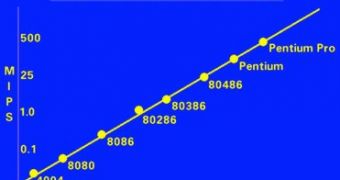Moore's Law is an empirical observation made in 1965 that basically says that the number of transistors inside an integrated circuit will double every 24 months, while costing the same to produce. This observation is attributed to Gordon E. Moore, a co-founder of Intel. Sometimes it is quoted as every 18 months, but on Intel's official Moore's Law page it appears in the 24-month form. There is a hidden link between the OLPC "$100 laptop" and Moore's Law, even if it is not so evident at first sight.
What the OLPC did was to build a good enough laptop for most offices in the world practically for spare change. The XO is not intended as an office appliance but with few and cheap extensions I imagine that it could be a hit. It is easy to attach a mouse and keyboard and all other sorts of peripherals to it, so the lack of them in its current form is easy to remedy. If someone thinks that it is too slow for ordinary office use, let me ask you then how many of the millions of office based computer users are exploiting their systems at maximum potential. Maybe consumers will realize that they don't really need to buy expensive hardware in order to get the job done and that most of the money invested in new hardware platforms for office use is thrown out the window.
An excerpt from Slashdot.org, cited by Ryan Orser's blog explains that better: "Cnet.co.uk wonders if the $100 laptop could spell the end of Moore's Law: 'Moore's law is great for making tech faster, and for making slower, existing tech cheaper, but when consumers realize their personal lust for faster hardware makes almost zero financial sense, and hurts the environment with greater demands for power, will they start to demand cheaper, more efficient 'third-world' computers that are just as effective?" Will ridiculously cheap laptops wean consumers off ridiculously fast components?"
Every single day since Moore's Law came around, hardware developers kept jumping up and down and trying their best to keep pace with it or even beat it. Up to a certain point, their attitude is justified, even more so since almost every new version of most commercial operating systems and applications (games included) required some sort of a hardware upgrade. Consumers on the other hand are responsible for putting more and more pressure on the hardware industry for both cheaper and better computer parts. That is, up until now. The interest for low power, low cost but still performant computing solutions is at an all times high because of several big releases like the OLPC XO laptop, the Classmate PC from Intel and the nicely built Asus Eee PC. And this interest could manifest itself as a decision not buy only the lower cost computers, thus practically shifting the entire computer industry to a new direction.

 14 DAY TRIAL //
14 DAY TRIAL //